From the Chief’s Corner: Politics, ERCES & The Road to Tallahassee...
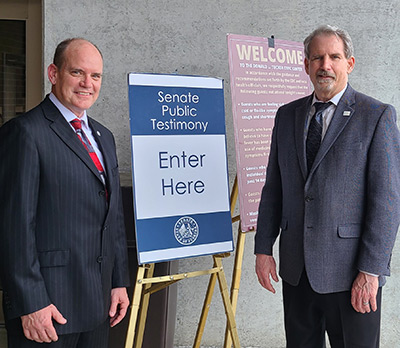
Posted on April 29, 2021
Think about the group of numbers 360, 415, 1408, 587, 1902, 1209. Do you know what each of them have in common? The fact is they all relate to Florida House and Senate bills for the 2021 Legislative Session, that had the potential to profoundly impact In-Building Public Safety Radio Code Enforcement in the state of Florida for years to come, and not in a good way. In actuality, the potential outcome would have been disastrous.
For example, several bills would have eliminated the installation of a communications enhancement system in any building four stories or less in height throughout the State of Florida. Think about the enormity of that alone. It would include hospitals, shopping malls, big box stores, nursing and residential care homes, schools, college and university buildings and many other critical structures. Occupancies such as these are where we know incidents have, and continue to occur; whereby public safety needs critical communications capabilities, to mitigate each incident and most importantly, protect those we are there to serve effectively and safely.
To help explain my point about “The Road to Tallahassee” I want you to imagine taking a trip in your car. During that journey you can make many choices when going from place to place. Some of those will include which road to take, what time to go, waiting on bad weather to pass, who will go with us and many others. Our goal is often how to make the trip exciting and enjoyable along the way. A significant aspect of truly enjoying that trip is the attitude and disposition of those traveling with us. However, no matter how much we plan, there are at times some unforeseen issues will certainly impact our trip. Issues such as car trouble, accidents, delays, and others. But what helps determine how much any of those will impact our trip, is our personal reaction to them. It is about choosing to be upset or choosing to see the opportunity that disruption afforded us.
Enforcing codes and standards can also be a lot like preparing for and taking a trip. There is a time and place for each step in the process. Based on historical trends and issues, we know of many outcomes that will and do occur along that road of codes and standards enforcement. We also know that through proper enforcement, that buildings will be built safer, people will be safer, and in the end, lives will be saved. Additionally, we know that code enforcement comes at a cost, and that cost is typically placed on the building owner. And sometimes if we are not careful, we develop (or more importantly create), unforeseen issues that impact our code enforcement trip…
So, let's unpack this concept of Politics, ERCES and The Road to Tallahassee…
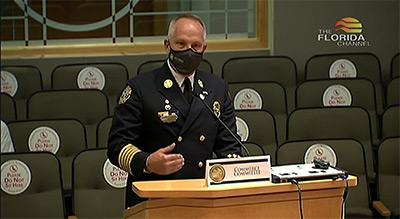 Politics… Politics…
First, I want to explain the politics by explaining the term “political issues”. For the context of this article, let us say the term identifies controversies that are debated within the political system; be it local, state, or federal. To become a “political issue” it means someone, somewhere had a significant problem with something, and made a call to their elected official they felt might be able to rectify the constituent’s issue. In many ways that is not such a bad thing, in so much as those attempting to rectify the issue fully understand all aspects of the actual or perceived “political issue,” and consider all the stakeholders in the process of developing a workable solution.
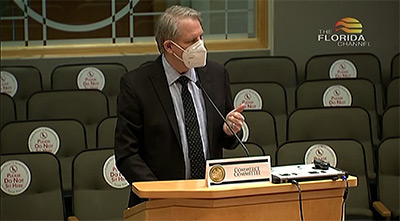 ERCES… ERCES…
Next is where the Emergency Responder Communications Enhancement System (ERCES) comes into the discussion. For many years, in almost every presentation I have given across the United States and Canada, I have made the statement:
“Don’t miss this, it’s important to understand that if you try and make the ERCES solutions ten feet tall and bulletproof, you will probably garner the attention of some legislator who may try and remove the requirement from your codes. If that happens, no one wins and by that, I mean the public safety responders and the public they are here to protect."
I encourage those who are responsible for enforcing the codes and standards to think about the big picture and most of the incidents that fire, law enforcement and EMS respond to. They are not major conflagrations. The goal of an ERCES is to improve the communications capability beyond what is there, not make it 100%. In fact, the codes and standards do not even require 100%, because it is not realistically attainable. I understand that most people do not want to do any more than is legally required, however, much of being a successful code enforcement officer is about one’s attitude and demeanor. It is about building relationships with all the stakeholders. Think about the Italian phrase Ben Franklin used in the 1744 publication Poor Richard’s Almanack: “a spoonful of honey will catch more flies than a gallon of vinegar”. This proverbial saying expresses the concept that it is more effective to be polite and understanding than to be hostile or demanding.
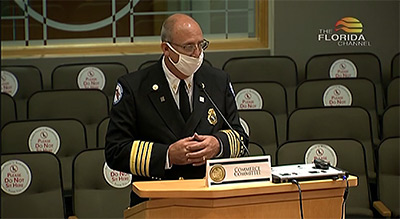 The Road to Tallahassee… The Road to Tallahassee…
ERCES became a “political issue” in Florida by getting on the radar of multiple legislators. Why, you ask? Because of something that can be defined with one-word: “overreach.” Defined as: “To defeat oneself by seeking to do or gain too much.” Think about it for a minute, the building industry is about economic development. So too are the elected officials and policy makers. For without economic development, there would be no funding to pay for many of the services a community needs in order to survive. When there is a real or perceived threat to economic development -- let’s be honest -- those with power can and often do utilize their status and influence in an attempt to address the issue. In our case, it is the installation of an ERCES.
A few reasons for ERCES landing on the legislative radar included but were not limited to; a few fire marshal’s applying overreach with their requirements, building owners wanting to defer or eliminate cost, and some building owners wanting to put the burden of in-building coverage back on the jurisdiction. The result of these were a real disaster as it relates to safety looming in Tallahassee. As mentioned earlier, several of these bills would have eliminated the installation of a communications enhancement system in any building four stories or less in height. Additionally, topics discussed included allowing the use of portable repeaters in lieu of fixed, in-building solutions, which do not meet the minimum requirements of the standards, requiring the jurisdiction to prove their macro radio system provides sufficient signal strength at every site, and shifting out compliance dates for existing buildings to 2030 and beyond. In essence, there was some really bad policy being debated that would have had a direct impact on the public and public safety responders.
Thankfully, through a lot of intel and work from the Florida Fire Chiefs Association (FFCA), the Florida Fire Marshals and Inspectors Association (FFMIA), and many of our SBC members, numerous concerns were identified, and a plan of action was developed. I cannot stress how important our SBC relationship with FFCA and FFMIA was in this important endeavor. They were able to bring a lobbyist to the table, who had extensive knowledge of the inner workings of the Florida legislative process. They were able to keep us informed throughout every step of the process and bring us in at the right moments to help.
John and I had the opportunity to travel to Tallahassee a couple of times to testify, along with many others on the team in committee hearings. Additionally, we were able to speak directly with some of the Florida legislators as to the issues contained within some of the bills being presented. In other words, many people were working to try and prevent bad bills with bad language from becoming the law of the land in Florida, thereby putting both the public and public safety responders at risk.
So, back to my analogy of comparing a road trip and code enforcement. When traveling by car, getting on someone’s radar (such as the police) is typically not a good thing if you are speeding. Likewise, getting on a legislator’s radar because of one’s actions (i.e., enforcing codes), can be a bad thing as well. I’ll be the first to admit, there are some groups out there that simply do not want to do anything when it comes to safety. In my experience, their focus, dare I say, is simply for profit. Be that as it may, that is not the only reason some of these bills were filed.
Through our conversations over the last couple of weeks with multiple legislators and their staff, we were able to hear their concerns related to building owners experiencing “overreach” by a few local fire marshals, which ultimately put the issue of ERCES directly on the legislators’ radar. It is important to clarify that I am not maintaining that anyone did something intentionally wrong, but the fact that multiple legislators took the time to draft a bill related to an ERCES and championed that piece of legislation through numerous hearings, indicates that they took the “ERCES political issue” pretty seriously. Based on some of the comments, some were enforcing requirements that exceeded the adopted code. When a code enforcement official makes a statement that you will do it my way no matter what or you will not get a certificate of occupancy, I can tell you that it will activate the radar detector. That type of action places the building owners in the crosshairs, and if we are being honest, nobody likes being in that position.
These types of situations must be avoided at all costs. Remember, if you cannot maintain the necessary minimum requirements within the code, there will be no regulation to enforce, no matter how important it may be. At the end of the day, if the safety regulation is removed, it is the people’s public safety it is there to serve that truly suffers. Regardless of whether you like politics or not, it is a reality, and everyone must understand how to navigate the right pathway.
Through the collective efforts of many, it is our hope that when the 2021 Florida Legislative Session comes to an end, the loss of the ability to enhance public safety communications in certain buildings such as those four stories or less, and the other negative issues will not become law. As of this writing, it appears that the only change will be extending the dates out a couple of years for existing buildings and changing the requirement for a permit to completion of a minimum radio strength assessment. That language is contained within Senate Bill 1408 and its companion in the House Bill 1209. These will continue to be monitored until the end of the 2021 legislative session.
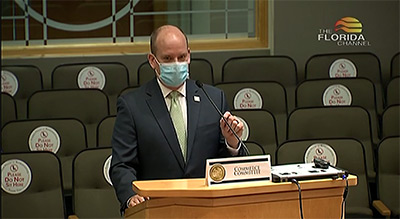 What Can You Do? What Can You Do?
The key takeaway from The Road to Tallahassee should teach everyone that people are constantly watching what is taking place, and those people can make decisions that will impact what is and what is not enforced in Florida, which quite frankly, can occur without considering the complete merits of the action. Of equal importance is the fact that this same scenario could be played out in any state, territory, or province. Therefore, it is imperative for stakeholders to find common ground through a balanced approach to compliance.
Here are some recommended steps for AHJ’s and Industry Partners to consider:
- Ensure personnel stay up to date on the latest requirements and methods to achieve them.
- Create effective policies and procedures that ensure overreach does not occur. For example, grant system integrators their requests to use the latest versions of code for their projects when permitted by law.
- Seek to value engineer each design, to ensure the best balance of code conformity and cost.
- Conduct compliance audits to ensure you are requiring and installing what is legally required. This includes not requiring systems in buildings or areas of buildings that do not need reinforcement.
- Develop relationships, not adversaries.
- Get involved in SBC workgroups.
- Follow bulletins and newsletters related to ERCES for the latest technical information and best practices.
- Keep an eye on your local and state government for any legislative activity that supports or threatens in-building coverage – and alert SBC Government Affairs team to both.
I am reminded of the 1916 Robert Frost poem, “The Road Less Travelled”. The road less travelled is an unconventional option. Metaphorically, it is also used to refer to what might have been, had you made different choices or taken an alternative approach. As a former code official, I learned that when enforcing regulations, it is necessary to have an open mind and understand that methods and materials often change faster than the next edition of the adopted codes and standards. Because of that dichotomy, many standards contain an important section located within the administrative chapter titled Equivalency. For NFPA 1221, section 1.5 states; “Nothing in this standard is intended to prevent the use of systems, methods, or devices of equivalent or superior quality, strength, fire resistance, effectiveness, durability, and safety over those prescribed by this standard”. The SBC is here to monitor all actions related to an ERCES that would have an impact on our members. To achieve the goal of eliminating wireless dead spots in buildings, all the stakeholders must continue to communicate and support each other. When we work together as a team, we can make sure public safety and the public are provided the critical communications they need in an emergency.
Remember, the choice of which road to take is yours. I do not know about you, but it seems to me that there are much better roads for traveling than that “Legislative Highway”.
See related article: Flurry of Florida Bills Target In-Building Public Safety Communications
|






